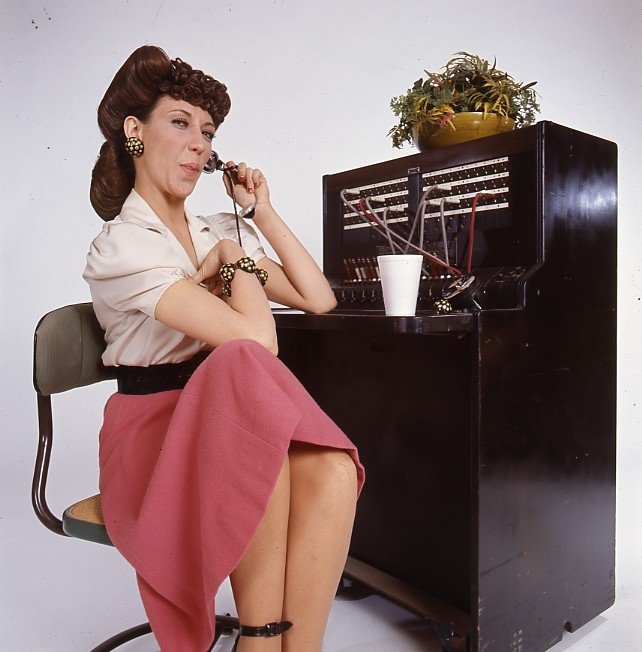signalmankenneth
Verified User
I have not used 411 or operator in decades?!!
New York CNN —
The operator is going off the hook for millions of customers.
Starting in January, AT&T customers with digital landlines won’t be able to dial 411 or 0 to reach an operator or get directory assistance. AT&T in 2021 ended operator services for wireless callers, although customers with home phone landlines can still access operators and directory help.
Verizon, T-Mobile and other major carriers still offer these services for a fee.
On a notice on AT&T’s website, the company directs customers to find addresses and phone numbers on Google or online directories.
“Nearly all of these customers have internet access to look up this information,” said an AT&T spokesperson.
But a century ago, the operator functioned asGoogle. Everyone knew it as “Information.”
“The operator was the internet before the internet. There’s a wonderful circularity there,” said Josh Lauer, an associate professor of media studies at the University of New Hampshire who is writing a book on the cultural history of the telephone.
Operator services were a selling point to customers during the late 1800s and early 1900s. The operator was the essential link in the dominant Bell System, owned by American Telephone & Telegraph (AT&T), telecommunications network.
The operator became the early face of the telephone, a human behind an emerging and complex technology. The job came to be occupied mostly by single, middle-class White women, often known as “Hello Girls.” The Bell System, known as Ma Bell, advertised its mostly female ranks of operators as servile and attentive – “The Voice with a Smile” – to attract and maintain customers.
Well into the 20th century, AT&T offered weather, bus schedules, sports scores, time and date, election results and other information requests.
“Telephone users interpreted her as an efficient way to locate any information,” wrote Emma Goodmann, an assistant professor of communication at Clarke University, in her 2019 paper on the history of telephone operators.
Three decades later, a Bell company said a customer called to ask the operator if he was a mammal, “like a whale,” while a woman wanted to know how to get a squirrel out of her house, according to Goodmann.
The advance of technology like the internet and smartphones, the deregulation of the telecomms industry in the 1980s, and other factors have left human operators virtually extinct. In 2021, there were fewer than 4,000 telephone operators, down from a peak of around 420,000 in the 1970s, according to Bureau of Labor Statistics data.
But there are still people who call the operator and request directory help.
“411 usage is not insignificant,” the FCC said in a 2019 report. The FCC estimated then that 71 million calls annually were placed to 411.
https://www.cnn.com/2023/01/07/business/telephone-operators-411-att-ctpr/index.html

New York CNN —
The operator is going off the hook for millions of customers.
Starting in January, AT&T customers with digital landlines won’t be able to dial 411 or 0 to reach an operator or get directory assistance. AT&T in 2021 ended operator services for wireless callers, although customers with home phone landlines can still access operators and directory help.
Verizon, T-Mobile and other major carriers still offer these services for a fee.
On a notice on AT&T’s website, the company directs customers to find addresses and phone numbers on Google or online directories.
“Nearly all of these customers have internet access to look up this information,” said an AT&T spokesperson.
But a century ago, the operator functioned asGoogle. Everyone knew it as “Information.”
“The operator was the internet before the internet. There’s a wonderful circularity there,” said Josh Lauer, an associate professor of media studies at the University of New Hampshire who is writing a book on the cultural history of the telephone.
Operator services were a selling point to customers during the late 1800s and early 1900s. The operator was the essential link in the dominant Bell System, owned by American Telephone & Telegraph (AT&T), telecommunications network.
The operator became the early face of the telephone, a human behind an emerging and complex technology. The job came to be occupied mostly by single, middle-class White women, often known as “Hello Girls.” The Bell System, known as Ma Bell, advertised its mostly female ranks of operators as servile and attentive – “The Voice with a Smile” – to attract and maintain customers.
Well into the 20th century, AT&T offered weather, bus schedules, sports scores, time and date, election results and other information requests.
“Telephone users interpreted her as an efficient way to locate any information,” wrote Emma Goodmann, an assistant professor of communication at Clarke University, in her 2019 paper on the history of telephone operators.
Three decades later, a Bell company said a customer called to ask the operator if he was a mammal, “like a whale,” while a woman wanted to know how to get a squirrel out of her house, according to Goodmann.
The advance of technology like the internet and smartphones, the deregulation of the telecomms industry in the 1980s, and other factors have left human operators virtually extinct. In 2021, there were fewer than 4,000 telephone operators, down from a peak of around 420,000 in the 1970s, according to Bureau of Labor Statistics data.
But there are still people who call the operator and request directory help.
“411 usage is not insignificant,” the FCC said in a 2019 report. The FCC estimated then that 71 million calls annually were placed to 411.
https://www.cnn.com/2023/01/07/business/telephone-operators-411-att-ctpr/index.html

